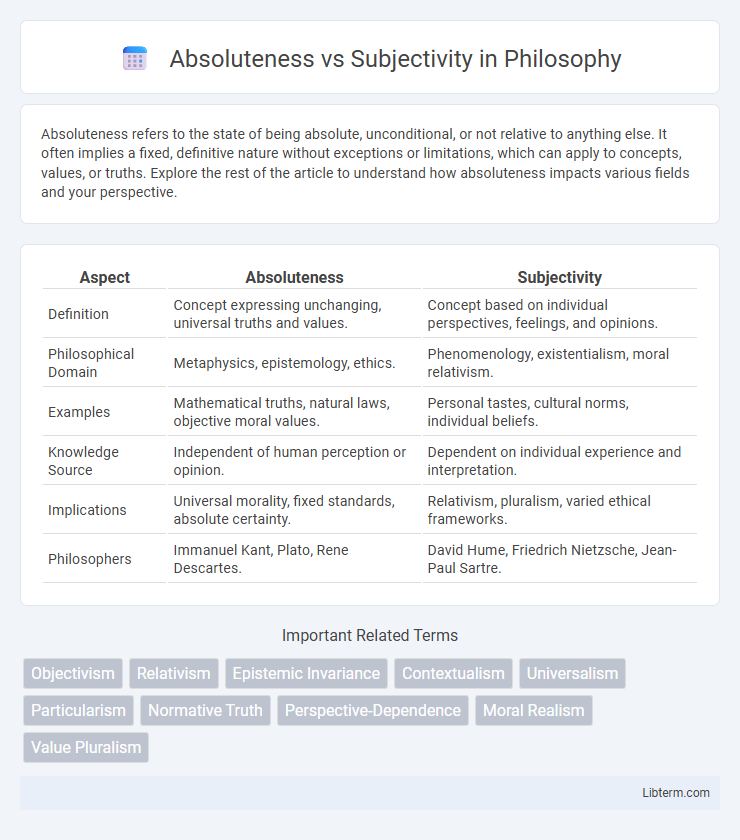Absoluteness refers to the state of being absolute, unconditional, or not relative to anything else. It often implies a fixed, definitive nature without exceptions or limitations, which can apply to concepts, values, or truths. Explore the rest of the article to understand how absoluteness impacts various fields and your perspective.
Table of Comparison
| Aspect | Absoluteness | Subjectivity |
|---|---|---|
| Definition | Concept expressing unchanging, universal truths and values. | Concept based on individual perspectives, feelings, and opinions. |
| Philosophical Domain | Metaphysics, epistemology, ethics. | Phenomenology, existentialism, moral relativism. |
| Examples | Mathematical truths, natural laws, objective moral values. | Personal tastes, cultural norms, individual beliefs. |
| Knowledge Source | Independent of human perception or opinion. | Dependent on individual experience and interpretation. |
| Implications | Universal morality, fixed standards, absolute certainty. | Relativism, pluralism, varied ethical frameworks. |
| Philosophers | Immanuel Kant, Plato, Rene Descartes. | David Hume, Friedrich Nietzsche, Jean-Paul Sartre. |
Defining Absoluteness: Core Concepts
Absoluteness refers to the quality of being universally valid and unchanging regardless of context or perspective, emphasizing objective truths grounded in facts or principles. It is characterized by definitive standards that apply consistently across situations, without influence from individual opinions or cultural variations. Core concepts of absoluteness include invariability, impartiality, and universality, which differentiate absolute truths from subjective interpretations.
Understanding Subjectivity: An Overview
Subjectivity involves personal perspectives, emotions, and individual experiences shaping one's interpretation of reality, contrasting with absoluteness which relies on universal truths and objective facts. Understanding subjectivity is crucial for analyzing human behavior, cultural differences, and decision-making processes where personal biases influence outcomes. This perspective highlights the variability in knowledge and perception, emphasizing the importance of context and individual viewpoints in constructing meaning.
Historical Perspectives on Absolute and Subjective Truths
Historical perspectives on absolute and subjective truths reveal a contrast between classical realism, which asserts eternal, unchanging truths independent of human perception, and postmodernism, which emphasizes the fluidity and cultural construction of truth. Philosophers like Plato championed absolute truths grounded in ideal forms, whereas thinkers such as Friedrich Nietzsche critiqued the notion, highlighting the role of individual interpretation and power dynamics in shaping truths. The evolution from metaphysical absolutes to epistemological subjectivity underscores ongoing debates about the nature of knowledge and reality.
Absoluteness in Philosophy and Ethics
Absoluteness in philosophy and ethics refers to the concept that certain moral principles or truths are universally valid and unchanging, regardless of context or individual beliefs. It posits that ethical standards exist independently of human opinion, grounding moral judgments in objective reality or divine command. This framework often contrasts with relativism by asserting fixed criteria for right and wrong, influencing debates on human rights, justice, and moral duties.
Subjectivity in Human Perception and Experience
Subjectivity in human perception and experience arises from individual differences in sensory processing, cultural background, emotions, and personal beliefs, leading to varied interpretations of the same event or information. This personal lens shapes how individuals construct reality, influencing judgments and decision-making based on internal perspectives rather than objective truth. Understanding subjectivity is crucial for fields like psychology, philosophy, and cognitive science to address the complexities of human behavior and knowledge formation.
Contrasts and Conflicts: Absoluteness vs Subjectivity
Absoluteness asserts that truths or moral principles are fixed, universal, and unchanging regardless of context or individual perspective. In contrast, subjectivity emphasizes that truth and morality are influenced by personal experiences, emotions, and cultural backgrounds, making them fluid and variable. This fundamental conflict generates ongoing debates in philosophy, ethics, and epistemology, highlighting the tension between objective standards and individual interpretation.
Absoluteness in Science and Objectivity
Absoluteness in science refers to the pursuit of universal truths and objective facts that remain constant regardless of individual perspectives. Scientific methods rely on empirical evidence, reproducibility, and unbiased observation to establish knowledge that transcends subjective interpretation. Objectivity ensures conclusions are based on measurable phenomena, minimizing personal or cultural influence to maintain the integrity of scientific findings.
Subjectivity in Art, Culture, and Language
Subjectivity in art, culture, and language emphasizes individual interpretation and personal experience as central to meaning-making. Artistic expression reflects diverse perspectives shaped by cultural backgrounds and emotional responses, resisting fixed or absolute interpretations. Language operates as a dynamic, evolving system where meaning varies according to context, speaker intent, and cultural nuances.
Balancing Absoluteness and Subjectivity in Modern Discourse
Balancing absoluteness and subjectivity in modern discourse requires recognizing universal truths while valuing individual perspectives shaped by culture and experience. Effective communication hinges on integrating objective facts with subjective insights to foster understanding and empathy across diverse viewpoints. This equilibrium enhances decision-making and promotes nuanced discussions in sociopolitical, ethical, and philosophical contexts.
The Future of Absoluteness and Subjectivity in Society
The future of absoluteness and subjectivity in society hinges on evolving cultural norms and technological advancements shaping human perspectives and decision-making processes. Increasing reliance on artificial intelligence and data-driven algorithms challenges traditional absolute truths, promoting a more subjective and context-dependent understanding of reality. This shift encourages dynamic ethical frameworks and adaptive social systems that accommodate diverse viewpoints and complex moral landscapes.
Absoluteness Infographic

 libterm.com
libterm.com